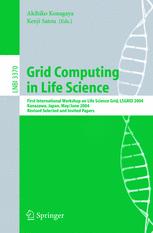

Most ebook files are in PDF format, so you can easily read them using various software such as Foxit Reader or directly on the Google Chrome browser.
Some ebook files are released by publishers in other formats such as .awz, .mobi, .epub, .fb2, etc. You may need to install specific software to read these formats on mobile/PC, such as Calibre.
Please read the tutorial at this link: https://ebookbell.com/faq
We offer FREE conversion to the popular formats you request; however, this may take some time. Therefore, right after payment, please email us, and we will try to provide the service as quickly as possible.
For some exceptional file formats or broken links (if any), please refrain from opening any disputes. Instead, email us first, and we will try to assist within a maximum of 6 hours.
EbookBell Team

5.0
20 reviewsResearchers in the ?eld of life sciences rely increasingly on information te- nology to extract and manage relevant knowledge. The complex computational and data management needs of life science research make Grid technologies an attractive support solution. However, many important issues must be addressed before the Life Science Grid becomes commonplace. The 1st International Life Science Grid Workshop (LSGRID 2004) was held in Kanazawa Japan, May 31–June 1, 2004. This workshop focused on life s- ence applications of grid systems especially for bionetwork research and systems biology which require heterogeneous data integration from genome to phenome, mathematical modeling and simulation from molecular to population levels, and high-performance computing including parallel processing, special hardware and grid computing. Fruitful discussions took place through 18 oral presentations, including a keynote address and ?ve invited talks, and 16 poster and demonstration p- sentations in the ?elds of grid infrastructure for life sciences, systems biology, massive data processing, databases and data grids, grid portals and pipelines for functional annotation, parallel and distributed applications, and life science grid projects. The workshop emphasized the practical aspects of grid techno- gies in terms of improving grid-enabled data/information/knowledge sharing, high-performance computing, and collaborative projects. There was agreement among the participants that the advancement of grid technologies for life science research requires further concerted actions and promotion of grid applications. We therefore concluded the workshop with the announcement of LSGRID 2005.